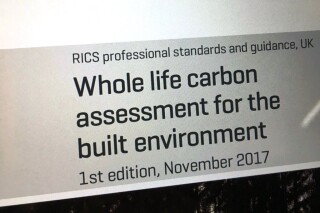First published in 2017, the 2023 edition is a global version of the standard that provides a more developed understanding of the carbon costs and benefits of design choices in construction and infrastructure projects and assets, RICS says.
The new standard was produced in partnership with the Department for Transport and Net Zero Waste Scotland.
Following a public consultation in March 2023, which received more than 1,300 responses, RICS has now updated the standard to be used globally and to cover all built assets and infrastructure projects throughout the built environment lifecycle.
RICS says that this professional standard is relevant not only to those undertaking carbon assessments but also to clients, investors and property managers.
In the UK, a Net Zero Carbon Building Standard is being developed incorporating the RICS Whole Life Carbon Assessment Professional Standard’s methodology to assess upfront, embodied, operational, user and whole-life carbon. RICS hopes that the global focus of this new edition will lead to more nations incorporating its methodologies into their regulatory structures.

RICS chief executive Justin Young said: “The second edition of Whole Life Carbon Assessment for the Built Environment encapsulates RICS's role as a global leader in the built environment and its duty to steer the industry towards decarbonisation. This second edition is a truly global standard for a global problem. I want to thank our members from every world region, our staff, partner specialists and the Department for Transport and Net Zero Waste Scotland for their hard work and crucial support, which made this a reality.
"At this year's COP28, where RICS is a UN-accredited observer organisation, we will promote this standard and ensure it is at the heart of the built environment's crucial response to climate change."
Charlotte Neal, RICS director of surveying standards, added: “The built environment has been crying out for tools to measure its impact on climate change, which is crucial for developing mitigating practices to significantly reduce the industry's carbon output. By providing a consistent methodology to assess the carbon output of buildings throughout their entire lifecycle, the second edition of WLCA will significantly improve the industry's ability to measure and manage its impact on climate.”
Got a story? Email news@theconstructionindex.co.uk




